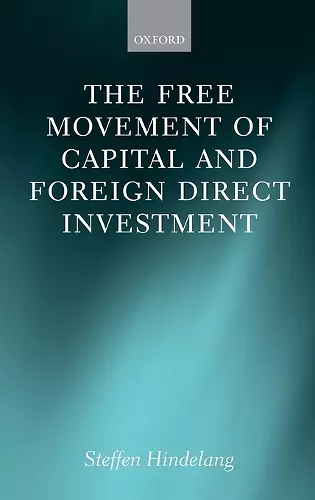The Free Movement of Capital and Foreign Direct Investment
The Scope of Protection in EU Law
Format:Hardback
Publisher:Oxford University Press
Published:9th Jul '09
Currently unavailable, and unfortunately no date known when it will be back

The scope of protection offered to foreign investors by EU law has become a matter of intense political debate. Neo-protectionist policies are on the rise within EU Member States, who are struggling to acclimatise to increasing inward direct investment from developing countries. Strict regulations are being implemented to control the flow of this investment, undermining the principle of free movement of capital. Are such policies permitted under EU law? What impact does EU law have on foreign direct investment? This book addresses these questions through a coherent doctrinal reconstruction of the EC Treaty provisions on free movement of capital in a third country context. Opening with a timely restatement of the central features of the EU law of free movement of capital, the book then asks the central question: What rights does a private market participant, engaged in cross-border direct investment originating from or directed to a non-EU Member State, enjoy by virtue of the EC Treaty? The book argues that in principle, the provisions on free movement of capital apply the same liberal standards irrespective of whether intra Community or third country direct investment is involved. Hence, those who participate in third country direct investment enjoy essentially the same guarantees by virtue of the provisions on free movement of capital as those active in intra Community direct investment. Having established the legal doctrine, the book then examines the limits on restrictions to free movement, including financial regulation and discriminatory tax regimes.
Hindelang's book is a very thorough study, with ample references to primary and secondary material, especially the abundant literature in German which he makes accessible to English readers for the first time. It will be the first port of call for free movement of capital in general and cross-border investment protection in particular under European Union law. Its scholarly influence will also radiate beyond the free movement of capital to the other freedoms, especially the freedom of establishment. * Michael Waibel, International and Comparative Law Quarterly *
...A remarkable piece. It bears witness to the growing interconnectedness of different areas of international law that have hitherto led lives in (splendid) isolation. In the present case, it is the growing interest in the intersection between international investment law, on the one hand, and EU law, on the other. The author's study is detailed and broadly covers both the relevant scholarly writings and the pertinent case-law. It would be hard to imagine a more thorough approach than Hindelang's. This book is not only a very valuable empirical study collecting and analyzing an enormous number of mostly ECJ cases, but also an impressive scholarly work containing very clear statements of the author's own assessment of the law. * August Reinisch, Austrian Review of International and European Law *
Hindelang has presented a vividly written piece of academic craftsmanship. He argues strongly for a liberal understanding of the internal market as an internationally open market. His focus is on investors and not on a presumption in favour of State sovereignty...Hindelang builds a strong opposition against the current interpretation of the Treaty rules by the ECJ and probably the mainstream in German academic literature. His study is worth reading: a thorn in the flesh of the current doctrine. * Christoph Ohler, Common Market Law Review, Volume 47, Issue 2, 2010 *
...this monograph will be an obligatory reference for all those who want to know how the free movement of capital is regulated in the EU...its up-to-date analysis of the ECJ's case law, its doctrinal effort towards the systematization of economic freedom rules, and its constant references to the German debate issues not fully dealt with in the English literature, make Hindelang's book a major contribution to the field * Fernando Losada Fraga, Universidad de Leon, European Journal of International Law, 21, 2010 *
Hindelang makes extensive use of the voluminous German language scholarship on free movement of capital. This is one of the great attractions of his work, as well as offering rigorous analysis of case law and of the underlying principles, he opens a window and lets in the refined output of that extensive legal literature * Leo Flynn, European Law Review, Vol 35, 892 *
...an important and timely contribution to an area where in-depth research in English literature has hitherto been relatively scarce...It is...written in a captivating style and many interesting arguments will certainly spark further debate. This study is also a mandatory reference in the post-Lisbon era, not least because it contains elements of a view of how the internal market mechanism circumscribes the Union's treaty-making practice in the field of FDI. * Philip Strik, Cambridge Law Journal *
An important and timely contribution to an area where in-depth research in the English literature has hitherto been relatively scarce...It is written in a captivating style and many interesting arguments will certainly spark further debate. This study is also a mandatory reference in the post-Lisbon era * Philip Strik, Cambridge Law Journal *
ISBN: 9780199572656
Dimensions: 240mm x 164mm x 29mm
Weight: 831g
448 pages